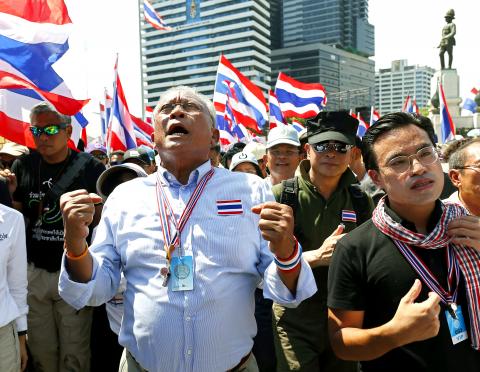Emboldened by the removal of the Thai prime minister, antigovernment protesters withdrew from the city’s main park yesterday and marched to the vacated prime minister’s office compound — where the protest leader Suthep Thaugsuban has pledged to set up his new office.
Meanwhile, the country’s new caretaker leader hosted his first formal news conference with foreign media at a makeshift, suburban outpost that has been the Thai government base for months. He shrugged off the protesters’ plans to occupy the symbolic seat of power.
“We do not want violence or any problems,” acting Thai Prime Minister Niwattumrong Boonsongpaisan said, defending the government’s hands-off approach as good crisis management.

Photo: EPA
In a 40-minute news conference, he reiterated calls for a July election and said he and his Cabinet were committed to finding a peaceful solution to the country’s deepening political crisis.
Yesterday’s developments highlighted the government’s lack of power as Thailand’s political crisis grinds into its seventh month.
Protesters achieved one of their goals last week when the Thai Constitutional Court dismissed former Thai prime minister Yingluck Shinawatra for nepotism in a case that many viewed as politically motivated.
They say her removal is not enough and want to set up an unelected “people’s council” to implement still-undefined reforms to combat corruption and money politics before an election can be held.
They oppose elections scheduled for July, which the current ruling party would likely win.
Suthep who has led the movement for six months, has called for a “final push” to install an unelected leader — a goal that critics call undemocratic, but supporters say is a necessary step to carry out needed reforms.
Yesterday, Suthep ended a months-long occupation of Bangkok’s Lumpini Park, a tropical oasis that protesters had converted into a litter-strewn campground.
He led thousands of supporters to the Thai parliament, where the Senate was holding a meeting yesterday to discuss the crisis and debate his controversial proposal for an appointed prime minister.

The Ministry of the Interior (MOI) is to tighten rules for candidates running for public office, requiring them to declare that they do not hold a Chinese household registration or passport, and that they possess no other foreign citizenship. The requirement was set out in a draft amendment to the Enforcement Rules of the Public Officials Election and Recall Act (公職人員選舉罷免法 ) released by the ministry on Thursday. Under the proposal, candidates would need to make the declaration when submitting their registration forms, which would be published in the official election bulletin. The move follows the removal of several elected officials who were

The Republic of China (ROC) is celebrating its 114th Double Ten National Day today, featuring military parades and a variety of performances and speeches in front of the Presidential Office in Taipei. The Taiwan Taiko Association opened the celebrations with a 100-drummer performance, including young percussionists. As per tradition, an air force Mirage 2000 fighter jet flew over the Presidential Office as a part of the performance. The Honor Guards of the ROC and its marching band also heralded in a military parade. Students from Taichung's Shin Min High School then followed with a colorful performance using floral imagery to represent Taiwan's alternate name

FOUR DESIGNATED AREAS: Notices were issued for live-fire exercises in waters south and northwest of Penghu, northeast of Keelung and west of Kaohsiung, they said The military is planning three major annual exercises across the army, navy and air force this month, with the navy’s “Hai Chiang” (海強, “Sea Strong”) drills running from today through Thursday, the Ministry of National Defense said yesterday. The Hai Chiang exercise, which is to take place in waters surrounding Taiwan, would feature P-3C Orion maritime patrol aircraft and S-70C anti-submarine helicopters, the ministry said, adding that the drills aim to bolster the nation’s offshore defensive capabilities. China has intensified military and psychological pressure against Taiwan, repeatedly sending warplanes and vessels into areas near the nation’s air defense identification zone and across

A Chinese takeover of Taiwan would severely threaten the national security of the US, Japan, the Philippines and other nations, while global economic losses could reach US$10 trillion, National Security Council Deputy Secretary-General Lin Fei-fan (林飛帆) wrote in an article published yesterday in Foreign Affairs. “The future of Taiwan is not merely a regional concern; it is a test of whether the international order can withstand the pressure of authoritarian expansionism,” Lin wrote in the article titled “Taiwan’s Plan for Peace Through Strength — How Investments in Resilience Can Deter Beijing.” Chinese President Xi Jinping’s (習近平) intent to take Taiwan by force